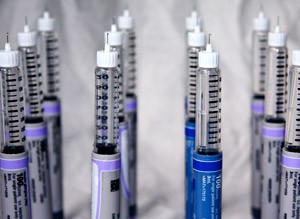Previously worked with several cycling teams
 Reports that the doping substances AICAR and TB-500 are being used by some in the peloton have gained weight with the news that a doctor linked to cycling was arrested earlier this month with both substances in his possession.
Reports that the doping substances AICAR and TB-500 are being used by some in the peloton have gained weight with the news that a doctor linked to cycling was arrested earlier this month with both substances in his possession.
According to El Pais, Alberto Beltrán Niño was arrested on March 7th in Barajas airport in Madrid, from where he was due to fly to Colombia. The two substances were seized, as were his laptop plus flash drives.
These will presumably be screened in order to try to determine who he was supplying products to. Beltrán has been in the Soto del Real prison since March 8th.
Both AICAR and TB-500 are products which have yet to produce positive tests in cycling, but have been suspected of use in sport. The former head of the AFLD [the French antid-doping agency – ed.] Pierre Bordry said in October 2009 that AICAR was utilized during that year’s Tour de France.
It is understood to help reduce body fat and also to cause blood vessels to dilate, boosting exercise ability. Bordry stated at the time that he was ‘shocked’ to see how thin some riders were.
TB-500 is based on the peptide hormone thymosin and is reported as increasing muscle growth and its repair, as well as causing new blood vessels to grow. The latter, known as Angiogenesis, is also part of the process whereby cancerous tumours spread, and so products boosting this vessel growth are regarded as potentially very dangerous.
The latter product made the news just before last year’s Tour de France when the former pro rider Wim Vansevenant, three times Laterne Rouge in the race, was linked to the illegal importation of TB-500.
The product was sent from Australia and intercepted at Zaventem airport by customs officials.
Vansevenant was a former rider with the Predictor Lotto team and was due to work for the squad – then called Omega Pharma Lotto – during last year’s Tour. His role was as one of five coach drivers for the team, looking after VIP guests.
He was dropped from this function once the news broke of his implication. Team manager Marc Sergeant denied that the products were intended for Omega Pharma Lotto. “He had not a lot of contact with our riders,” he said. “He told me himself that he barely knows the team guys.”
Vanseveant reportedly imported 2,000 euro worth of the product. He claimed it was for his own use, and that he took it to keep in shape after his retirement.
Alberto Beltrán Niño’s arrest came as a result of a long investigation known as Operation Skype. According to El Pais, it was launched in Barcelona because there the doctor allegedly sold a form of EPO called Retacrit to the then-Xacobeo Galicia rider David Garcia Dapena during the 2010 Vuelta a Espana.
Garcia Dapena subsequently tested positive for hydroxyethyl starch and, when other samples were analysed, for EPO. The newspaper reports that he decided to cooperate with police and implicated Beltrán Niño.
The latter has long been suspected of doping athletes in sport. In April 2001 the-then Selle Italia team doctor was arrested near Modena with a car loaded with doping products. He was fired from the team and later worked for Kaiku, Liberty Seguros and Xacobeo Galicia.
Riders have tested positive from each of those teams, with three riders from the Liberty team being busted in the wake of the 2009 Tour of Portugal, including the overall winner Nuno Ribeiro. Subsequently disqualified, he fingered Beltrán Niño as the supplier.
The latter emigrated to Bahrain in late 2009, and is thought to have distributed doping products via intermediaries since then. El Pais suggests he could be facing a jail sentence of two years. The details of his computer files and the current investigation will determine if the issue spreads further.